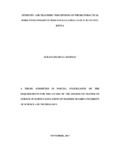STUDENTS’ AND TEACHERS’ PERCEPTIONS OF PHYSICS PRACTICAL WORK IN SECONDARY SCHOOLS IN KAKAMEGA EAST SUB-COUNTY, KENYA
Abstract
In the last ten years, The Kenya National Examinations Council (KNEC) has reported unsatisfactory performance in the physics practical paper 232/3 despite the enthusiasm for practical work among the teachers of physics. In its recent annual report (KNEC 2011), The National mean scores in physics practical paper for the years 2007, 2008, 2009, 2010 and 2011 were 25.85, 23,92, 22,37, 22.,24 and 15.22 respectively. The figures listed above are a clear indication that practical work in physics is not yielding the much anticipated results . It is in view of this observation that the present study was initiated in Kakamega East Sub-County to establish the reasons for the current trends in the use of practical work in the teaching and learning of physics. The purpose of this study was to assemble, organize scrutinize, analyze and interpret the students and teachers perceptions of physics practical work. In this Study, a sample of one hundred (100) students and twenty (20) teachers of physics drawn from fifteen (15) public secondary schools by simple random methods were used. In this study the researcher adopted a purposive survey design to enable him gather information on the students and teachers perceptions of physics practical work because survey produces large amounts of empirical data based on real world observation in a short time for fairly low cost. A questionnaire was used to collect the raw data for this Study. A pilot study for this study was conducted in two public secondary schools to establish the reliability of the research tool. The reliability of the research tool was determined using Miles and Hubermann’s formulae and found to be 0.77. The information collected in this study was presented by use of frequency tables and analyzed using percentages. The findings of the study indicated that the majority of the students and teachers viewed practical work as a series of investigations that requires good organization and familiarizes students with apparatus and enables them to learn by doing. It is hoped that the findings of this study will go along way in informing teachers of physics and curriculum developers. The finding of this study will be used by curriculum developer to review the current curriculum and make the necessary changes in line with the best practices.
Collections
- School of Education [71]

